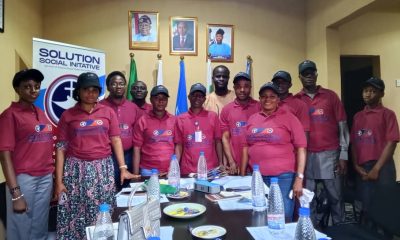Featured
NJC Declines Adeleke’s Request To Replace Osun CJ, Sacks High Court Judge
The National Judicial Council (NJC) chaired by the Chief Justice of Nigeria, Justice Olukayode Ariwoola, rose from its 104th meeting of December 6 and 7, 2023, affirming that Justice Adepele Ojo is still the recognised Chief Judge of Osun State.
The Council directed Osun State to revert to status quo after declining the request of Governor Ademola Adeleke requesting its permission to swear in the next Most Senior Judge in the State in acting capacity, following allegations levelled against the Chief Judge and the resolution of the State House of Assembly to suspend him.
A statement signed by the Director of Information of the NJC, Soji Oye, says the council also recommended the compulsory retirement of a judge of the Osun State High Court, Justice Sakariyah Oyejide Falola, from the Bench.
The recommendation follows the findings of an investigation committee in a petition written by Mr Dapo Kolapo Olowo and Polaris Bank against the judge for granting a Garnishee Order Absolute against the bank for the sum of N283,174,000.00 (Two Hundred and Eighty-Three Million, One Hundred and Seventy-Four Thousand Naira) in a questionable and strange manner.
The committee found the conduct of Justice Falola traveling to Lagos to visit the counsel of the bank in his chambers on the issue of Garnishee Proceedings, unbecoming of the standard expected of a judicial officer.
Consequently, the NJC in the exercise of its disciplinary powers under the Constitution has suspended Justice Falola from office pending the approval of the recommendation of his compulsory retirement by Governor Adeleke.
The Council also considered the reports of other investigation committees that had concluded their sittings, and dismissed the petitions written against the Chief Judge of Akwa Ibom State, Justice Ekaete Obot.
It similarly dismissed petitions against Justice Benson Anya of the High Court of Abia State, Justice Zainab Bage-Abubakar of the Federal High Court, and Justice Opufaa Ben-Whyte and Justice Augusta Chuku, both of the High Court of Rivers State, for being unmeritorious, or for withdrawal of the petitions by the petitioners.
Justice Anne Akobi of the High Court of the Federal Capital Territory is to be issued a letter of guidance to take proper charge and control of her court.
The NJC also considered the Report of its three Preliminary Complaints Assessment Committees on 51 fresh petitions written against Federal and State Judicial Officers and decided to constitute 11 Panels to investigate petitions that had merits and dismissed the remaining petitions for being subjudice, having been withdrawn, and the subject judges having retired from service.
The Council also resolved to report a Senior Advocate of Nigeria, Ajibola Aribisala, to the Legal Practitioners’ Privileges Committee (LPPC) for investigation and disciplinary action, for the unpalatable and derogatory remarks he made against a judicial officer and by extension, the NJC in his petition to the council.
Read the full press release of the NJC below:
NJC SACKS ONE JUDGE FOR MISCONDUCT – EMPANELS 12 COMMITTEES TO INVESTIGATE JUDICIAL OFFICERS
The National Judicial Council under the Chairmanship of Hon. Justice Olukayode Ariwoola, GCON, at its 104th Meeting of 6 & 7 December 2023 has recommended the compulsory retirement of Hon. Justice S. O. Falola of Osun State High Court from the Bench.
The recommendation was made sequel to the findings of an Investigation Committee in a petition written against His Lordship by Mr Dapo Kolapo Olowo and Polaris Bank for granting a Garnishee Order Absolute against the Bank for the sum of N283,174,000.00 (Two Hundred and Eighty-Three Million, One Hundred and Seventy-Four Thousand Naira) in a questionable and strange manner, and endorsement of the Order, attaching the account of the Garnishee with another garnishee and not the account of the Judgment Debtor who had the legal obligation to pay the supposed judgement sum.
They found that the subject Judge misconducted himself by entertaining Suit No HIK/41/2018 when there was no evidence of a judgement of the Kwara State High Court before him, neither was there a Certificate of Registration of same in Osun State to confer jurisdiction on him.
It further found the conduct of the subject Judge travelling to Lagos to visit the Counsel of the Bank in his Chambers on the issue of Garnishee Proceedings, unbecoming of the standard expected of a Judicial Officer.
Consequently, Council resolved to recommend him to Governor Ademola Adeleke of Osun State for compulsory retirement with immediate effect.
Meanwhile, in the exercise of its disciplinary powers under the 1999 Constitution of the Federal Republic of Nigeria, as amended, the National Judicial Council has suspended Hon. Justice S. O. Falola from office pending the approval of the recommendation of his compulsory retirement by the Osun State Governor.
Council considered the Reports of other Investigation Committees that had concluded their sittings, and dismissed the Petitions written against Hon. Justice Ekaete F. F. Obot, Chief Judge, Akwa Ibom State, Hon Justice Benson C. Anya of High Court Abia State, Hon. Justice Z. B. Abubakar of Federal High Court, Hon
Justice Opufaa Ben-Whyte and Augusta Uche K. Chuku of the High Court of Rivers State, for being unmeritorious, or withdrawal of petition by the Petitioners.
However, Hon Justice A. I. Akobi of the High Court of the Federal Capital Territory is to be issued a letter of guidance to take proper charge and control of his Court.
The Plenary also considered the Report of its three Preliminary Complaints Assessment Committees on 51 fresh petitions written against Federal and State Judicial Officers and decided to constitute 11 Panels to investigate petitions that had merits and dismissed the remaining petitions for being subjudice, having been withdrawn, and the Subject Judges having retired from serviceCouncil also resolved to report A. A. Aribisala, SAN to Legal Practitioners’ Privileges Committee (LPPC) for investigation and disciplinary action, for the unpalatable and derogatory remarks he made against a Judicial Officer and by extension, the NJC in his petition to the Council.
Council considered and declined the request of Governor Ademola Adeleke of Osun State requesting its permission to swear in the next Most Senior Judge in the State in acting capacity, following allegations levelled against Hon. Justice Adepele Ojo, Chief Judge, Osun State and the resolution of the State House of Assembly to suspend him.
The Council affirmed that Hon. Justice Ojo is still the recognised Chief Judge of Osun State, and would not work on the resolution of a State House of Assembly, as it is the only body constitutionally empowered to investigate Judicial Officers and recommend same for any action to the Governor. Consequently, Osun State should revert to status quo.
It also received notification of retirements of seven Judicial Officers and notification of deaths of six serving Judicial Officers of Federal and State Courts.
Featured
Nigeria Accounts For 70% Of 11m Illegal Arms In W/Africa

The National Center for the Control of Small Arms and Light Weapons (NCCSALW) says that Nigeria is accountable for 70 per cent of 11 million illegal arms and light weapons in West Africa,
Mr Alex Ebimiebo, the South South Zonal Director of the NCCSALW, made the remark at the Naval Warfare Course 9 Inter-Agency seminar, organised by the Naval War College in Calabar on Thursday.
Ebimiebo presented a paper themed, “Strengthening Security Agencies Collaboration to Counter Illicit Arms Proliferation for Enhanced National Security in Nigeria.”
He said that the illegal arms dealings were largely responsible for Nigeria’s 2.2 million Internally Displaced Persons (IDPs) and 26,000 refugees in neighboring countries.
Ebimiebo further said that arms proliferation had led to economic distortions, an increase in violence, crime, and impediment to peace building.
He, however, called for concerted effort from all Nigerians to tackle the menace, saying that NCCSALW would take the fight to the society since security is the responsibility of everyone.
“So, as a result, everybody is a stakeholder, so as such, we need to involve the whole society in this fight and the center has a lot of programmes for collaboration with our sister agencies.
”We also have advocacy and sensitisation programmes that we take to members of the general public from time to time,” he said.
Meanwhile, Rear Adm. Akinola Oludude, Commandant, Naval War College, expressed concern on the influx of illicit arms into Nigeria since 2020.
He attributed this to the extensive borderline of about 4,470 kilometers between Nigeria, the Republic of Benin, Niger, Chad, and Cameroon.
He also noted that the nation’s maritime domain that extended over 853 kilometers of coastline and of the Gulf of Guinea had also not helped.
The commandant said that the 2021 survey by the NCCSALW revealed that over six million illegal weapons were in circulation in the country.
Oludude said that out of the figure, about 70 per cent were in the hands of non-states actors.
”The impact of this illicit arms proliferation is profound and multifaceted.
”These weapons bred various forms of insecurity, including terrorism, banditry, kidnapping, communal clashes, and armed robbery.
“Inter-agency collaboration is needed to tackle the proliferation of illicit arms and weapons,” he said.
Oludude said that no single agency, no matter how well-resourced, no matter how well-dedicated, could effectively tackle the complex challenge alone.
He stated that the nature of the recent arms proliferation demanded a joint and multi-agency approach.
“Therefore, this seminar provides a vital platform for us to collectively examine the complexities of this complex challenge,” he said.
Also speaking, the Flag Officer Commanding (FOC), Eastern Naval Command, Rear Adm. Kennedy Ezete, urged the participants to translate the discussions and recommendations of the seminar into concrete actions.
He advised the participants to take the knowledge and insights gained to their respective agencies and organisations and implement them
According to him, “we must ensure that the suggestions and way forward developed here are implemented effectively and that the partnerships forged are sustained.
”This requires a commitment from all stakeholders, including the leadership of our security agencies and the wider community.
”Share your experiences, implement the strategies that have been suggested, and continue to work collaboratively to counter illicit arms proliferation.
“We must also continue to invest in training, technology, and intelligence gathering to enhance our capabilities.”
Featured
NLC Threatens Strike, Issues Seven-Day Ultimatum

The Nigeria Labour Congress (NLC) yesterday issued a seven-day ultimatum to the Federal Government over its failure to constitute the governing board of the National Pension Commission.
The Labour Centre also accused the government of diverting workers’ funds through the Nigeria Social Insurance Trust Fund.
According to a communiqué signed by its President, Joe Ajaero, the Central Working Committee of the NLC met on Wednesday, August 13, 2025, to deliberate on urgent issues affecting Nigerian workers, the trade union movement, and the nation at large.
The meeting addressed the leadership crisis in the Edo State Council of the NLC, what it described as alarming developments in the NSITF, the governance vacuum in PENCOM, and the broader state of the nation.
The communiqué noted that the CWC expressed outrage at the ongoing assault on workers’ social protection rights through the Federal Government’s diversion of 40% of workers’ contributions to the national coffers as “revenue,” describing it as a flagrant violation of the statutes establishing the NSITF.
“Equally condemnable is the new administration’s false claim of ownership of the NLC National Headquarters, a property owned by Nigerian workers; the resort to cyber and media bullying of the trade unions and leadership, coupled with covert moves to amend the NSITF Act in a manner that would disenfranchise workers and give the government full control over the funds.
“The CWC warns that these actions represent a direct attack on workers’ rights, hard-earned resources, and the principle of tripartite governance enshrined in international labour standards.
“The Congress affirms that the NSITF belongs to the Nigerian working class and will mobilise all legitimate means to ensure workers’ interests are protected,” Ajaero said.
On the steps to be taken, the NLC president stated, “The NSITF must account for and return all diverted funds within seven working days from today.
“The PENCOM board must be properly constituted in full compliance with the law within seven working days from today.
“The Pension Commission must submit to the NLC a full status report of the funds within the same period.
“If at the end of these seven working days, nothing is done, the NLC will no longer guarantee industrial peace in the sector.”
Featured
Nigeria’s Sustainability Challenges Are Not Insurmountable, Says Ibas
The Administrator of Rivers State, Retired Vice Admiral Ibok-Ete Ekwe Ibas, says Nigeria’s sustainability challenges can be overcome by aligning applicable principles of accounting ethics and environmental stewardship.
The Administrator indicated that by investing in green skills, civic engagement and being accountable, not only in financial deficits but ecological practices, Nigeria can build a nation that thrives within the global entity.
Retired Vice Admiral Ibas noted this in a keynote address during the opening ceremony of the Institute of Chartered Accountants of Nigeria (ICAN) 8th Southern Zonal Conference in Port Harcourt, yesterday.
Expatiating on the theme, ‘Eco-Disruption and Sustainability Challenges: The Way Forward,’ the Administrator, represented by Secretary to the State Government, Prof. Ibibia Lucky Worika, stressed that the topic was timely, especially against the background of recent changes in world environment.
According to him, “Our world is changing. Climate change, deforestation, pollution, and unsustainable consumption patterns are no longer abstract concerns. They are here, disrupting ecosystems, economies, and everyday life from the rising flood waters of the Niger Delta to the advancing desert sands in the north.
“Accountants and Eco-Disruption are an unlikely but vital alliance. It is not every day that you see a room full of accountants discussing eco-disruption. After all, when we think of accountants, we picture balance sheets, not biodiversity; ledgers, not lagoons; profit margins, not mangrove swamps. And yet, here we are about to talk climate change with people whose natural habitat is the spreadsheet.
“I must say, if the planet knew its fate was being discussed by accountants, it might feel strangely reassured… or start worrying about whether we are about to amortize the ozone layer. But in truth, your role in this conversation is critical. Because sustainable development is not only about planting trees, it’s about restructuring systems. It’s about applying logic, measurement, discipline, and ethics to our collective footprint. These are things accountants excel at.
“In the Niger Delta, where we are gathered today, the evidence is stark, coastal erosion and sea-level rise are threatening entire communities. Biodiversity is in decline, with mangrove forests and aquatic life under siege from oil pollution and invasive species. Rainfall patterns are shifting, compromising agriculture, food systems and freshwater supplies. Oil spills, bush burning, and deforestation continue to erode environmental health and human livelihoods. These disruptions not only threaten our environment, they destabilize our economy, our security and our very identity as a people.”
Vice Admiral (Rtd.) Ibok-Ete Ekwe Ibas, further stressed that strategies to develop effective policy towards environmental stewardship must change to ensure institutional reforms in cognisance of socio-economic, environment and human sustainability.
“The four pillars of environmental, economic, social, and human sustainability must now guide our policy choices and institutional reforms. We must move from extractive to regenerative systems.
“We must rethink how we produce, consume, and account for the value we create not just in financial terms, but in ecological and social impact as well. Strengthen environmental governance and community engagement, support clean energy with targeted fiscal policies and green financing, promote afforestation and mangrove restoration, intergrate sustainability into educational curricula and professional ethics, including accounting practices and invest in data, transparency and inclusive planning at all levels of government and industry,” he said.
Earlier, the President of ICAN, Mallam Haruna Nma Yahaya, while appreciating the Government of Rivers State for its hospitality, noted that, Nigeria’s renewable energy sector alone has the capacity to reduce unemployment challenges.
“The renewable energy sector alone has the potential to create over 300,000 jobs and contribute $7.4 billion annually to our GDP by 2030 if properly harnessed. Moreover, aligning our policies with the United Nations Sustainable Development Goals, particularly Goals 7, 12, and 13, could unlock more than $1 trillion in market opportunities for Africa by 2030. Eco-disruption, therefore, is not merely a challenge; it is also an invitation to innovation and leadership.
“As chartered accountants, we occupy a unique position at the intersection of finance, governance, and sustainability. We are called to champion the sustainability agenda through improved environmental accounting, sustainability reporting, and innovative green financing mechanisms. We can lead the way by promoting ESG disclosures and adopting the International Sustainability Standards Board frameworks, ensuring that our businesses and institutions not only comply with global requirements but also contribute meaningfully to sustainable development.
“Integrating climate resilience into budgeting and incentive eco-friendly investments will allow Nigeria to build a low-carbon economy while attracting green financing and stimulating growth in climate-smart sectors. Furthermore, by promoting public-private partnerships for green infrastructure, we can help the nation achieve its Net-Zero Energy Transition Plan,” he added.
He encouraged all members to join the ICAN ESG and Sustainability Faculty to equip themselves with the requisite knowledge and competence to navigate the evolving landscape of environmental, social, and governance reporting, to position the professionals for leadership in the emerging global green economy.
-
Business4 days ago
Investment Flow To Nigeria Drops By 70%
-
 Business3 days ago
Business3 days agoAfDB Secures N3.4trn For Agro-industrial Processing In Nigeria
-

 Featured4 days ago
Featured4 days agoNigeria Accounts For 70% Of 11m Illegal Arms In W/Africa
-
Business4 days ago
CBN Plans Legal Action Against FX Contract Violators
-
Politics4 days ago
APC Doesn’t Have Money, Relies On Elected Members For Funds – NWC Member
-
Politics4 days ago
Rivers LG Polls: IPAC Asks Political Parties Not To Participate
-

 News3 days ago
News3 days agoNCos Frees 28,149 Inmates After Payment Of Fines, Compensation In 2024
-
News4 days ago
Be Cautious About AI, VC Tells Scholars


